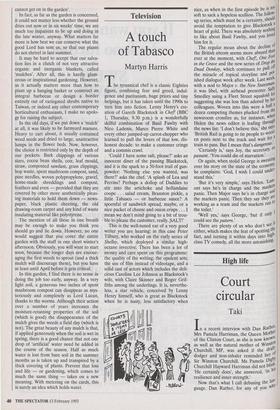Gardens
Wet wet wet
Ursula Buchan
It would be pleasing to think that we :night learn some eternal and immutable fh from our experience of the weather in the last few months, perhaps even acquire a deeper insight into how to manage our .,.s .'"rdens. However, as most of us, myself llikelucled cannot clearly remember what the weather was like a week last Wednes- day, let alone in February 1991, it is hard to see quite how that might happen. Though not as much as the Cassandras (If the water companies might like, we have certainly had some rain since last August. In my part of the world — the East Mid- 'ands/East Anglia border — our average annual rainfall of about 20 inches fell in lit- tle more than three months.
After three dry, anxious years, when we s4 even mature trees put under stress, we naturally congratulated ourselves on 4U-ire's capacity to reassert a kind of '°11gh equilibrium and promptly forgot all 4b01-1t it. If the subject has intruded since (that is for those not living in the east of Scotland, who saw their three-piece suites floating away in several feet of melted snow n January) it has only been as an excuse to laugh at the NRA for stressing the need for more rain to replenish ground water sup- "es, and as trigger for a grumble that 'we cannot get on in the garden'.
In fact, as far as the garden is concerned, it could not matter less whether the ground dries out now or in six weeks' time; we are much too impatient to be up and doing in the late winter, anyway. What matters far more is how best we can conserve what the good Lord has sent us, so that our plants do not shrivel in late summer.
It may be hard to accept that our salva- tion lies in a clutch of not very attractive organic and inorganic blankets, called 'mulches'. After all, this is hardly glam- orous or inspirational gardening. However, as it actually matters more than how to plant up a hanging basket or construct an integral barbecue or design a border entirely out of variegated shrubs native to Taiwan, or indeed any other contemporary horticultural enthusiasm, I make no apolo- gy for raising the subject.
In the old days, if we put down a 'mulch' at all, it was likely to be farmyard manure. Heavy to cart about, it usually contained weed seeds and dried to large, unattractive lumps in the flower beds. Now, hoWever, the choice is restricted only by the depth of our pockets. Bark chippings of various sizes, cocoa bean shells, coir, leaf mould, straw, composted sawdust, grass clippings, hop waste, spent mushroom compost, sand, pine needles, woven polypropylene, gravel, home-made shreddings and compost, feathers and even — provided that they are covered by other more aesthetically pleas- ing materials to hold them down — news- paper, black plastic sheeting, the old drawing-room carpet and any kind of waste insulating material like polystyrene.
The mention of all these in one breath may be enough to make you think you should go and lie down. However, no one would suggest that you cover the entire garden with the stuff in one short winter's afternoon. Obviously, you will want to start soon, because the longer days are encour- aging the first weeds to sprout (and a thick mulch will discourage them), but you have at least until April before it gets critical.
In this garden, I find there is no sense in doing the job too early, anyway. In a very light soil, a generous two inches of spent mushroom compost can disappear as mys- teriously and completely as Lord Lucan, thanks to the worms. Although their action over a number of years increases the moisture-retaining properties of the soil (which is good) the disappearance of the mulch gives the weeds a field day (which is not). The great beauty of any mulch is that, if applied generously when the soil is wet in spring, there is a good chance that not one drop of 'artificial' water need be added in the course of the season. Half as much water is lost from bare soil in the summer months as is taken up and transpired by a thick covering of plants. Prevent that loss and life — or gardening, which comes to much the same thing — takes on a new meaning. With metering on the cards, this is surely an idea which holds water.



















































 Previous page
Previous page